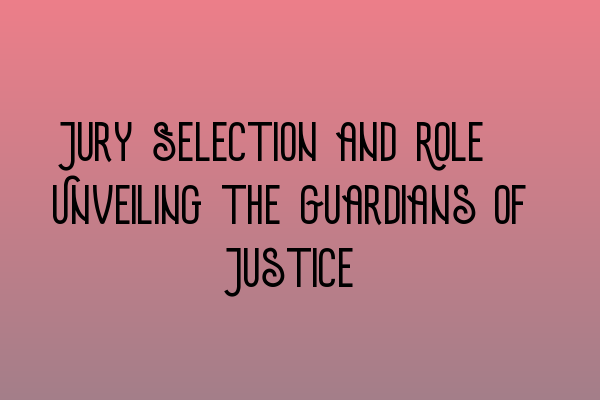Jury Selection and Role: Unveiling the Guardians of Justice
When it comes to criminal trials, one of the most crucial aspects is the jury selection and their role in the judicial process. The jury, often referred to as the “guardians of justice,” plays a pivotal role in determining the facts of the case and delivering a fair and impartial verdict. In this article, we will explore the intricacies of jury selection and shed light on their essential role in the pursuit of justice.
Understanding the Jury Selection Process
The jury selection process, also known as voir dire, is the method by which potential jurors are chosen to serve on a specific trial. It is important to note that the selection of jurors is a critical step in ensuring a fair and unbiased trial. The process typically involves the following steps:
- Potential jurors are randomly selected from a source such as the electoral register or driving license database.
- Attorneys from both parties, along with the judge, conduct a thorough examination of the potential jurors to determine their suitability for the trial.
- During this examination, the attorneys may ask questions regarding the potential juror’s background, beliefs, and experiences to evaluate their impartiality and ability to make an unbiased decision.
- Based on the answers provided, the attorneys can exercise their right to challenge potential jurors through either a peremptory challenge (without providing a reason) or a challenge for cause (providing a valid reason).
- Once both parties have completed the examination and challenges, the remaining jurors are sworn in and become the jury for the trial.
It is worth noting that the jury selection process aims to create a balanced and representative jury. The goal is to ensure that the jury consists of individuals from diverse backgrounds who can bring their unique perspectives and experiences to the trial.
The Role of the Jury in a Criminal Trial
Now that we have a better understanding of the jury selection process, let’s delve into the role of the jury within a criminal trial. The primary responsibilities of the jury include:
- Listening to the evidence presented by both the prosecution and the defense.
- Evaluating the credibility and reliability of witnesses.
- Deliberating on the facts of the case.
- Applying the relevant law as instructed by the judge.
- Reaching a unanimous or majority verdict, depending on the jurisdiction.
During their deliberations, the jury must carefully consider the evidence and determine the guilt or innocence of the accused. Their decision should be based solely on the facts presented in court and not influenced by personal biases or prejudices.
The Importance of Jury Impartiality
Impartiality is one of the fundamental principles governing the jury system. It ensures that every individual is entitled to a fair trial and prevents any external influences from compromising the integrity of the judicial process. A fair and impartial jury is essential in upholding justice and maintaining public confidence in the legal system.
To guarantee impartiality, potential jurors are carefully questioned during the selection process to identify any potential biases that may hinder their ability to make an unbiased decision. Attorneys have the right to challenge potential jurors who they believe may not be impartial or have preconceived notions about the case.
However, it is important to consider that even with rigorous selection procedures, absolute impartiality can never be guaranteed. Jurors are human beings with their own beliefs, experiences, and inherent biases. The challenge lies in recognizing and mitigating these biases through the questioning process and instructions provided by the judge.
Conclusion
Jury selection and their role in the judicial process are vital elements in ensuring a fair and impartial trial. As the guardians of justice, jurors have the responsibility of carefully considering the evidence presented in court and delivering a verdict based on the law and facts. Their participation ensures that the legal system remains transparent and accountable, upholding the principles of justice.
For more information on legal topics, please check out our related articles:
- Unveiling Duress and Undue Influence in Contracts
- Essentials of Consideration: Understanding the Backbone of Contracts
- Express and Implied Terms in Contracts: Decoding Agreement Components
- Counter-offers: Navigating Negotiations in Contract Law
- Mistake in Contract Law: Unraveling the Impact on Agreement Validity
